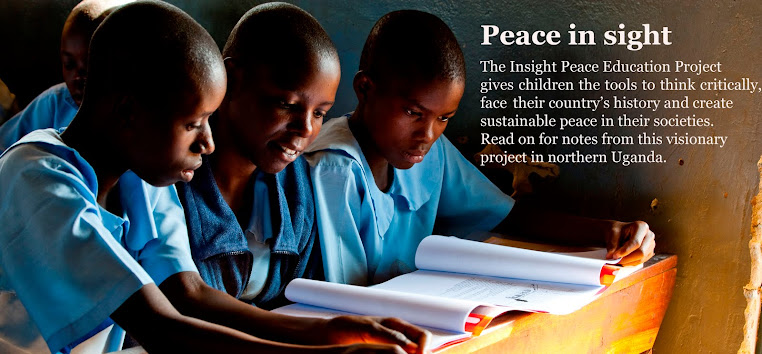The past few/couple/I’m not even sure how many weeks have truly been an exhausting whirlwind. Holly and I were preparing to formally present our project to our core local advisory group at what became officially known as our 3-day Modules and Content Development Committee (MCDC) Workshop. Relatively new to the world of workshop facilitation, Holly and I were anxious - would the MCDC find our materials appropriate for the Northern Ugandan context? Would we fall on our faces? Would the committee members participate? Before I tell you all about how awesome the workshop was (and how outstanding Holly and my facilitating skills turned out to be), let me shed a little light on what exactly this MCDC workshop was all about.
Before even setting foot in Uganda, Holly and I partnered with several exceptional organizations in the field of peace education. For the purposes of the MCDC workshop, we utilized materials from two of these organizations, Facing History and Ourselves (FHAO) and Tapori.
FHAO is an internationally recognized organization that promotes civic responsibility, tolerance, and social action among youth through innovative curricula and teaching modules. The content and activities covered in our MCDC workshop were most heavily based on FHAO, and fell into the following units: 1) Identity and Individualism; 2) Communities and Conflict Resolution; 3) Case Study: The Holocaust; and 4) Promoting Peace: Be the Change.

We used Tapori’s collection of issue-based children’s stories to illustrate some of the complex concepts introduced by FHAO. For example, a story about Jacinto from Guatemala depicts a young boy living in poverty, who suffers from hunger and must regularly skip school in order to help his half-blind uncle tend to their crops, provides a context for our primary school students to understand the overly legalized jargon of “Human Rights.”
While all of our materials went over well, our MCDC members were particularly enthusiastic about the Holocaust case study- something truly groundbreaking in the Ugandan education system. They eagerly explored the causes, realities and consequences of hatred, as they made connections to their own atrocity-ridden past. We designed the program to give Ugandans a case study to which they could connect their own experience with mass atrocity. We were hesitant to present formal lessons on recent Ugandan history, but it quickly became clear that open discussion about the war carried out by the Lord’s Resistance Army will be an essential element of our program.

Kaa salama,
Miriam

 Paicho, the site of one of our two pilot schools, has become somewhat of a hybrid between the two. During the armed conflict, mud huts stood crammed together, tens of thousands of people living 9 or 10 to a room. Food was delivered once or twice monthly to long crowded lines of families waiting to receive bags of rice. Camps were set up for people who lived in remote areas to provide protection from rebel attacks and abductions. But often the camps increased the efficiency of rebel activity, condensing large populations into one relatively small, miserable space with a disturbingly disproportionate guard-to-civilian ratio.
Paicho, the site of one of our two pilot schools, has become somewhat of a hybrid between the two. During the armed conflict, mud huts stood crammed together, tens of thousands of people living 9 or 10 to a room. Food was delivered once or twice monthly to long crowded lines of families waiting to receive bags of rice. Camps were set up for people who lived in remote areas to provide protection from rebel attacks and abductions. But often the camps increased the efficiency of rebel activity, condensing large populations into one relatively small, miserable space with a disturbingly disproportionate guard-to-civilian ratio.

 Politicians, celebrities and international humanitarian advocates puzzle endlessly over the best ways to carry out development work, dumping funding into large-scale cut-and-paste programs. Many of them are missing the local component. We would go a long way in supporting transitional democracies simply by spending the time to find the individuals who make magic happen in their communities. These are the people we need to support.
Politicians, celebrities and international humanitarian advocates puzzle endlessly over the best ways to carry out development work, dumping funding into large-scale cut-and-paste programs. Many of them are missing the local component. We would go a long way in supporting transitional democracies simply by spending the time to find the individuals who make magic happen in their communities. These are the people we need to support.